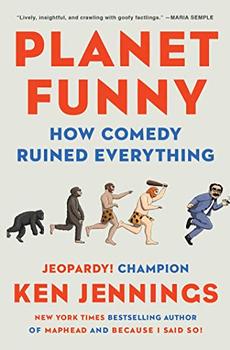Summary | Excerpt | Reviews | Beyond the book | Read-Alikes | Genres & Themes | Author Bio

One Man's Humble Quest to Become the Smartest Person in the World
by A. J. JacobsPart memoir and part education (or lack thereof), The Know-It-All chronicles NPR contributor A.J. Jacobs's hilarious, enlightening, and seemingly impossible quest to read the Encyclopaedia Britannica from A to Z.
33,000 pages
44 million words
10 billion years of history
1 obsessed man
Part memoir and part education (or lack thereof), The Know-It-All chronicles NPR contributor A.J. Jacobs's hilarious, enlightening, and seemingly impossible quest to read the Encyclopaedia Britannica from A to Z.
To fill the ever-widening gaps in his Ivy League education, A.J. Jacobs sets for himself the daunting task of reading all thirty-two volumes of the Encyclopaedia Britannica. His wife, Julie, tells him it's a waste of time, his friends believe he is losing his mind, and his father, a brilliant attorney who had once attempted the same feat and quit somewhere around Borneo, is encouraging but, shall we say, unconvinced.
With self-deprecating wit and a disarming frankness, The Know-It-All recounts the unexpected and comically disruptive effects Operation Encyclopedia has on every part of Jacobs's life -- from his newly minted marriage to his complicated relationship with his father and the rest of his charmingly eccentric New York family to his day job as an editor at Esquire. Jacobs's project tests the outer limits of his stamina and forces him to explore the real meaning of intelligence as he endeavors to join Mensa, win a spot on Jeopardy!, and absorb 33,000 pages of learning. On his journey he stumbles upon some of the strangest, funniest, and most profound facts about every topic under the sun, all while battling fatigue, ridicule, and the paralyzing fear that attends his first real-life responsibility -- the impending birth of his first child.
The Know-It-All is an ingenious, mightily entertaining memoir of one man's intellect, neuroses, and obsessions and a soul-searching, ultimately touching struggle between the all-consuming quest for factual knowledge and the undeniable gift of hard-won wisdom.
This is the perfect book to dip into, so don't relegate it to the book shelf ; keep it in the bathroom, by the bed, in the car, or wherever you're likely to find yourself with a few spare minutes...continued
Full Review
 (295 words)
(295 words)
(Reviewed by BookBrowse Review Team).
If your shelf space allows it, I encourage you to buy yourself a set of encyclopedias. However, I'm not thinking of the modern Britannica (because you can save a lot of trees and money by buying the electronic version of the entire 32 volumes for less than $70 at http://britannica.com) but an older encyclopedia. We've had many happy hours with our 10 volume Chambers Encyclopedia (1892) that we bought for the equivalent of about $75 in England almost twenty years ago. Not only is it fairly useful for referencing history before the 19th century but it also provides a fascinating snapshot of how the late 19th century educated classes saw their world. Our favorite entry is an explanation of why powered ...

If you liked The Know-It-All, try these:

by Anne Curzan
Published 2025
A kinder, funner usage guide to the ever-changing English language and a useful tool for both the grammar stickler and the more colloquial user of English, from linguist and veteran professor Anne Curzan

by Ken Jennings
Published 2019
From the brilliantly witty and exuberant New York Times bestselling author Ken Jennings, a history of humor - from fart jokes on clay Sumerian tablets all the way up to the latest Twitter gags and Facebook memes - that tells the story of how comedy came to rule the modern world.